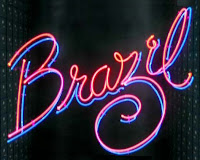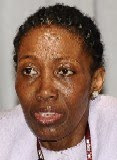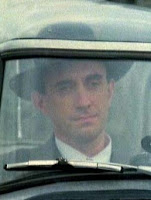 so I will think about Brasil today :-)
so I will think about Brasil today :-)Up, Down.
snow mixed with rain yesterday, and frost on the rooftops this morning ... "winter is icummen in, lhude sing Goddamm,"
Canada, land of such complacency, land of callous & hypocritical & cynical politicians & bureaucrats complicit in torture, where a man is killed by police in the Vancouver airport more than two years ago and the RCMP weasels are still waffling over it, so I just don't want to think about it anymore ... maybe Prince Charles had a similar thought (if he didn't, he should have):




not that simple of course, some weedy pundit, Christie Blatchford, has now examined Richard Colvin's emails and not found enough to back up his allegations, she thinks, if she can be said to think ... but it echoes with a feeling I had that Richard Colvin was too convenient, that maybe he was put up to it as a smoke-screen while Harper the cockroach wiggled out from under Global Climate Heating - now that is really silly isn't it? could they be that cynical? I am obviously losing it ... nutbar ...
"At first I thought I was fighting to save rubber trees, then I thought I was fighting to save the Amazon rainforest. Now I realise I am fighting for humanity."
Francisco Alves Mendes Filho, aka Chico Mendes, 1944-1988.
"I don't call it anything," said Frankie Lee with a smile."
Bob Dylan, The Ballad Of Frankie Lee And Judas Priest, 1968.
Bob Dylan, Must Be Santa, 2009.





The Rich at Play
And how much can we charge for the use of the swing?
But who would pay to use a swing Dr. Hermés?
OK then, tell them to take it down.
they played this today, and it was like the answer to a prayer:
Lo, how a Rose e’er blooming from tender stem hath sprung!
Of Jesse’s lineage coming, as men of old have sung.
It came, a floweret bright, amid the cold of winter,
When half spent was the night.
Isaiah ’twas foretold it, the Rose I have in mind;
With Mary we behold it, the virgin mother kind.
To show God’s love aright, she bore to men a Savior,
When half spent was the night.
The shepherds heard the story proclaimed by angels bright,
How Christ, the Lord of glory was born on earth this night.
To Bethlehem they sped and in the manger found Him,
As angel heralds said.
This Flower, whose fragrance tender with sweetness fills the air,
Dispels with glorious splendor the darkness everywhere;
 True Man, yet very God, from sin and death He saves us,
True Man, yet very God, from sin and death He saves us,And lightens every load.
O Savior, Child of Mary, who felt our human woe,
O Savior, King of glory, who dost our weakness know;
Bring us at length we pray, to the bright courts of Heaven,
And to the endless day!
15th Century German carol, on YouTube: 1, 2, 3, 4, 5, 6, 7, 7.
Isaiah 11:1 - And there shall come forth a rod out of the stem of Jesse, and a branch shall grow out of his roots.

a very difficult piece to sing ...
Brazil, where hearts were entertaining June
We stood beneath an amber moon
And softly murmured "someday soon"
We kissed and clung together
Then, tomorrow was another day
The morning found me miles away
With still a million things to say
Now, when twilight dims the sky above
 Recalling thrills of our love
Recalling thrills of our loveThere’s one thing I’m certain of
Return I will to old Brazil
That old Brazil
Man it's old in Brazil
Brazil ...
Frank Sinatra - Brazil (1981), Terry Gilliam - Brazil (1985).
Appendices:
1. E-mail trail only adds to Afghan questions, Christie Blatchford, Nov. 28 2009.
1a. CPAC video of Richard Colvin at the Committee.
1b. of Os Tres Amigos, aka the Generals.
1c. of David Mulroney, Bob Rae's chum.
1d. Special Committee on the Canadian Mission in Afghanistan (AFGH).
Dessima M. Williams:
2a. AOSIS - Alliance of Small Island States.
2b. GRENED - Grenada Education and Development Project.
***************************************************************************
E-mail trail only adds to Afghan questions, Christie Blatchford, Nov. 28 2009.
Richard Colvin's secret correspondence provides little light on detainee issue after a week in which Ottawa rejected his claims
For a week, diplomat Richard Colvin's accusations about Canada's handling of its Afghan prisoners – and their subsequent alleged torture at the hands of Afghanistan's National Directorate of Security – dominated headlines and Parliament, despite the fact that no one had seen the e-mails in which Mr. Colvin said he had tried to wake Ottawa to the problem he saw as so serious.
The Globe and Mail now has what appears to be the entire collection of the e-mails Mr. Colvin sent on the subject during the 17 months he spent in Afghanistan from April of 2006 to October of 2007. A couple are virtually completely blacked out; some are heavily redacted, others rattle on at such length they could have done with a little more redacting.
It seems to have been Mr. Colvin's visit to the provincial prison in Kandahar city on May 16, 2006, that first triggered his concern. But that inspection and an earlier one upon which he relied, made in December of 2005 by the International Committee of the Red Cross, were, in the Afghan context, practically sunny about their findings.
The ICRC rated the Kandahar prison the best of the four it inspected; it was “not that bad” and “not the worst in Afghanistan,” that honour going to the facility in Uruzgan, the Dutch area of control. Even to Mr. Colvin, the Kandahar prison seemed “to be in reasonably good condition,” inmates got “enough food” and, he said, most were through the courts within 15 days (unlikely, as the courts in Afghanistan were at that time almost non-existent).
And though Mr. Colvin was careful to note that his guide at the prison was guarded and speaking “in code,” the guide's harshest characterization of detainee treatment was that some were being held in “unsavoury” or “unsatisfactory” conditions.
Of a five-page e-mail, Mr. Colvin devoted four paragraphs, most of this not blacked out, to the treatment of detainees by Afghan authorities.
It is a long way from that mild pronouncement to Mr. Colvin's testimony last week before a special parliamentary committee, where he said unequivocally that most of the Afghans detained by Canadian soldiers weren't “high-value targets” but rather “just local people, farmers, truck drivers, tailors, peasants, random human beings in the wrong place at the wrong time” and that Canadian troops had “retained and handed over for severe torture a lot of innocent people.”
How he got from one polar extreme to the other isn't much clarified by the dozens of e-mails he sent in the interim.
He wrote only three of them in 2006, only one more in the first three months of 2007. The vast majority were written in April that year, about the time The Globe and Mail's series on abuses in Afghan prisons appeared – or afterward – and prompted the government to stop handing over prisoners to Afghan authorities until a new protocol could be arranged.
As context for Mr. Colvin's tour in Afghanistan, it should be noted that he arrived at Kandahar Air Field on April 28, 2006, and went several days later to the Provincial Reconstruction Team headquarters on the outskirts of town, where he spent about seven weeks – leaving the compound, as comfortable and safe a place as there is in that country, only once for a few hours.
That was his “outside the wire” tour, which means that in his information gathering, he would have relied heavily upon phone interviews with Afghans, contacts with the ICRC and other non-governmental agencies, and any journalists, local or foreign, he may have met at the PRT.
Mr. Colvin then headed off for a month's leave in July, spending the remainder of his time in Afghanistan at the Canadian embassy in Kabul, finally heading home in October of 2007.
By the kindest reckoning, he would have spent a grand total of a half-day outside the wire in Kandahar.
Certainly, this does not diminish his time in that hard country – and he was there as a diplomat, not as a soldier or journalist – but it does mean he got nowhere near what's called a “point-of-capture” on a battlefield and had no visceral sense of who it was Canadian troops were detaining.
Once in charge of Kandahar Province in January of 2006, Canadian troops were in the thick of battle almost immediately. Depending where in the province they were, they were either in gunfights or getting blown up, or trying to avoid being blown up, virtually every day.
And they took a lot of prisoners – many more than either the British, who were at the time in Helmand Province where things were then relatively quiet, or the Dutch, who were later moving into Uruzgan.
From the start, Canadian soldiers were using gunshot residue tests (this was mentioned by the former chief of defence staff Rick Hillier in his testimony to the committee this week, but the significance of the remark went unnoticed) to sift the wheat from the chaff.
They detained only those who tested positive for GSR (meaning they had recently either fired a weapon or been right beside someone who had), were found with guns or bomb-making parts or near IED strikes or were otherwise highly suspicious, such as well-dressed men carrying large amounts of Pakistani cash.
Mr. Colvin's claim that innocent farmers were being cruelly dispatched to torture suggests he paid scarce attention to the “Taliban by night” phenomenon, whereby the man who farms by day becomes, under cover of darkness, a low-level fighter in the insurgency. Whether he acts out of need or is coerced into fighting with the Taliban, once he begins shooting or planting bombs, for the soldier, he is the enemy.
The only real clue in the 30-item e-mail and report trail to Mr. Colvin's increasing urgency is that – after The Globe series – his impatient pleas for swift change and better prisoner monitoring won him no friends in the Ottawa bureaucracy. In these demands, he was proven right, and in his anger about being muzzled by a hyper-secret government, which he made most strongly in an end-of-assignment report he never sent his superiors, he was hardly alone.
With these e-mails now, finally, in the public domain, albeit in a redacted form, Canadians may have more information but they know less.
In condemning with the same brush highly professional Canadian soldiers, and to complain that they were complicit in breaches of the law of armed conflict and knowingly buried his reports, it is Mr. Colvin who has some explaining left to do.




1 comment:
Blatchford must be reading a different set of Colvin e-mails. Here is an extract from another e-mail:
[redacted] have personally seen physical evidence of abuse, including scars on legs, and heard credible allegations of abuse by all three detainees we interviewed in Kabul who were willing to discuss the issue.
[redacted]
Although the monitoring provisions in the MOU are designed to ensure that Canadian-transferred detainees are not abused [redacted] The embassy therefore suggested transferring detainees to Kabul. Provided they are placed in the 'open' facilities (Sederat or Pol-i-Charki). [redacted] This is the solution followed by the [redacted] However, the military resisted transferring detainees to Kabul as this would place additional demands on military resources. (This seems to have been one of the key reasons why Canada, from the beginning, declined to monitor detainees at all, in contrast to our [redacted] in the south.)
Post a Comment